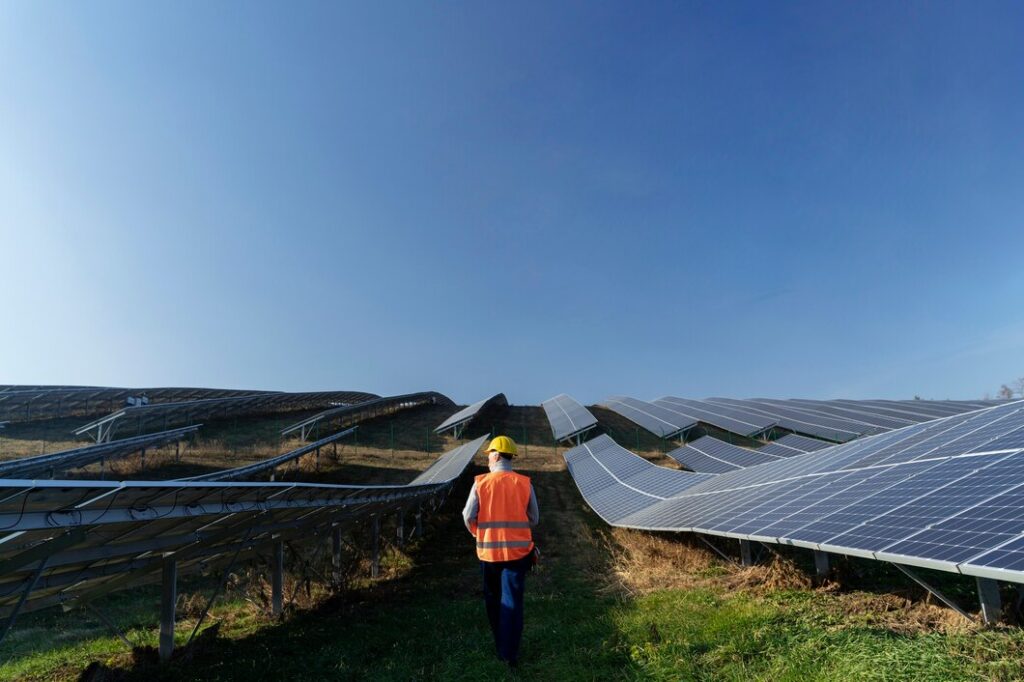Solar panels are made out of photovoltaic cells that convert the sun’s energy into electricity.
Photovoltaic cells are sandwiched between layers of semi-conducting materials such as silicon. Each layer has different electronic properties that energise when hit by photons from sunlight, creating an electric field. This is known as the photoelectric effect – and this creates the current needed to produce electricity.
Solar panels generate a direct current of electricity. This is then passed through an inverter to convert it into an alternating current, which can be fed into the National Grid or used by the home or business that the solar panels are attached to.
It is our aim to provide a professional experience from project initiation through to handover and we pride ourselves on giving the best advise possible regarding the most appropriate system size and equipment selection.
It is essential that the thought is given to safe future access for roof-based installations as annual cleaning of the solar panels will be required to ensure optimal performance throughout the system life.
Solar panel cleaning may be instructed to a specialist cleaning company or carried out by a suitably qualified window cleaning company with the appropriate safety training for roof access systems. We can also arrange this on your behalf as a complete package if instructed.
Apart from keeping the solar panels clean and free from pests, we also advise annual testing of the electrical installation and this is a service we offer in house. This testing involves disconnecting and testing the DC cables from the panels to check for insulation faults, visual inspection of the electrical installation and overall system performance checks.
We can also sign in to the system monitoring platform to look for faults and liaise with the equipment manufacturers on your behalf to resolve issues.
Generating your own energy is extremely rewarding, and you can further optimise the experience by storing excess energy in batteries.
Every homeowner has a unique energy usage pattern — some may use more energy during the day, while others may have higher usage in the evenings or on weekends. Battery storage can help capture the excess solar energy that isn’t used at the exact moment it’s generated.
For example, if your household is typically unoccupied during the day, think of all the excess energy being generated in the summer months when daylight hours are long. Or if your usage is lower on weekends, the solar panels will still be generating power — and that energy can be stored and used when it’s needed most, such as during the evening or early on a Monday morning.


Grid connections to new buildings can be expensive, sometimes prohibitively so, if this is the case on your new project we can help. Please get in touch with our design team and we will be happy to advise on budget costs for a full off-grid system.
MD Electrical Construction Limited provide a full range of electrical installation, maintenance and repairs to domestic, commercial and industrial systems. We operate in and around the whole of England.
Founded in 2013, we bring over a decade of experience in electrical and renewable installations, offering unparalleled breadth of knowledge compared to newer companies.
Our ISO 9001 and 14001 certifications ensure internationally recognised standards in quality and environmental management.
By analysing site-specific half-hourly meter readings, we customise system designs to precisely meet each client’s needs.
Through our partners, we provide tailored funding solutions, including leasing and Power Purchase Agreements (PPAs).
Our designs adhere to RC-62 Fire Safety requirements, integrating advanced safety measures such as SolarEdge Optimizer systems, firefighter rapid shutdown switches, roof walkways, and safety lines.
We help clients ensure compliance with fire loss prevention requirements to maintain valid insurance coverage for solar installations.